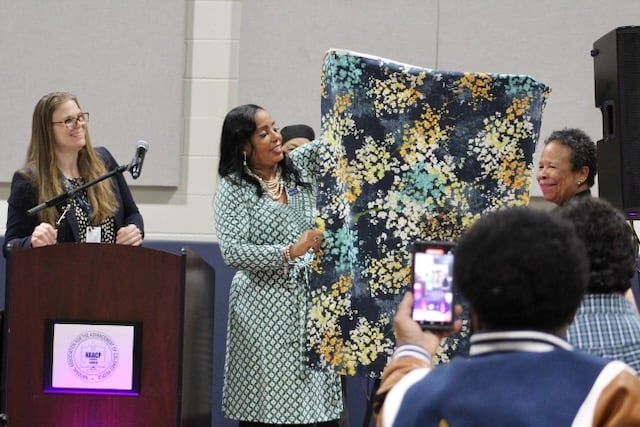
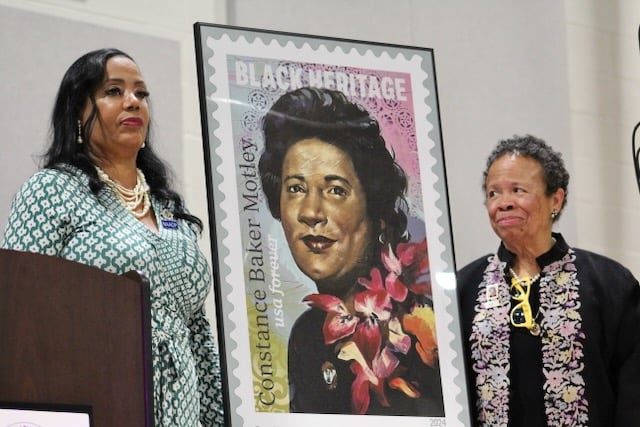
Top photo: Greater New Haven NAACP President Dori Dumas and Constance Royster, niece of the late Judge Constance Baker Motley, unveil a picture of the 47th Black Heritage Stamp. Markeshia Ricks Photos.
New Haveners have a reason to stand a little taller when they’re mailing their letters and cards during this year’s Black History celebrations. Prominent civil rights attorney, politician and later judge, Constance Baker Motley – an Elm City daughter – is now the forever face of the U.S. Postal Services 47th Black heritage stamp.
Motley’s roots run deep in New Haven and many of those roots run right through the institutions that shaped her life here, directly influencing the person she became and the important work she would go on to do. Those institutions include the Dixwell community, St. Luke’s Episcopal Church, James Hillhouse High School, the local NAACP and the very place where everyone gathered Thursday night – the Dixwell Community House, better known as the Q House.
Captured by acclaimed Martha Vineyard-based artist Charly Palmer, Motley’s visage was unveiled to a packed audience at the Dixwell Community House filled with Motley’s New Haven family and her many admirers who gathered to celebrate a hometown hero who many said is deserving of greater recognition in the city and the nation.
“When we first heard that the U.S. Postal Service had chosen her for the 47th Black Heritage Stamp, we said, ‘Well it’s about time,’” said Greater New Haven NAACP President Dori Dumas.
The day of the unveiling of the stamp in New Haven was also officially Constance Baker Motley Day in Connecticut deemed so by a proclamation from Gov. New Lamont.
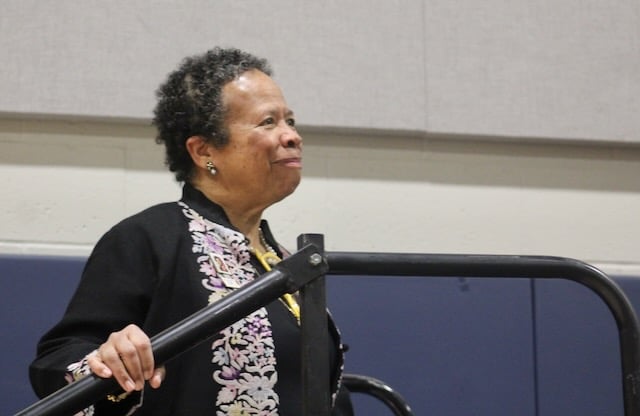
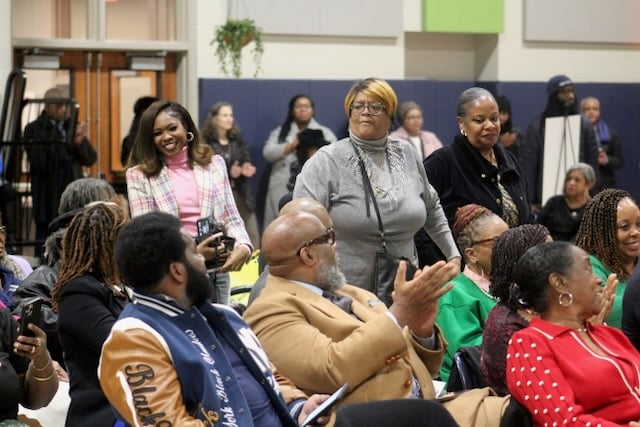
Top: Royster prepares to speak. Bottom: Member of the Motley family who were asked to stand at the stamp unveiling.
Her niece and namesake, Constance L. Royster told the crowd, which included many of Motley's extended family, that had the Q House not existed, her aunt, who would go on to become a tenacious and successful civil rights attorney who represented the Rev. Martin Luther King Jr. and led the roughly 20 years of legal fights that desegregated schools in the United States might not have had the chance to make change in America.
A seminal event – a community meeting about the Q House much like those that still happen all over New Haven today – thrust a young woman with a gift for public speaking into the spotlight. Royster said her aunt’s willingness to speak up and advocate for her community put her in the path of a prominent philanthropist who would see Motley’s potential, fund her entire education and mentor her. Motley would go on to pay it forward in her broader civil rights work dismantling segregation, by notching many notable firsts, and mentoring and inspiring a generation of future Black lawyers and judges including the nation’s first Black woman to serve on the U.S. Supreme Court, Justice Ketanji Brown and Connecticut's first Black woman U.S. Attorney Vanessa Roberts Avery.
“I often think of her example, when called upon to do things that may challenge the status quo,” said Avery, who also is a New Haven native, “ to advocate for things that others think is impossible.”.
“I imagine the courage she had to have to face hostility and her confidence despite blatant bias against her,” Avery added. “It reminds me that one person’s impact can be profound even if she is a Black woman from very humble beginnings.”
Just Connie
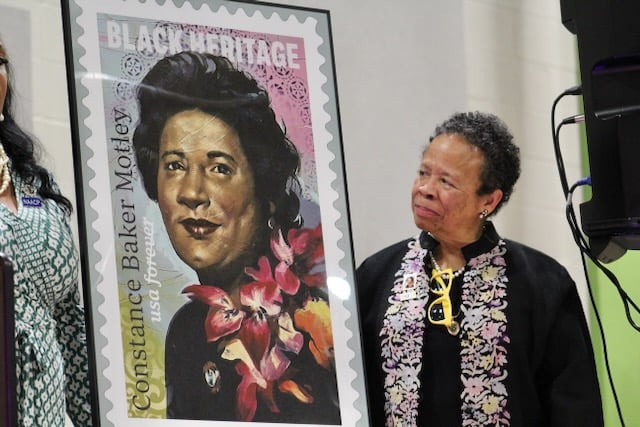 Before she was a history-making civil rights attorney, a New York state senator and later a federal court judge, Motley was Constance Baker. A daughter, affectionately known as “Connie” in a big West Indian family of nine children, from the two-island nation of St. Kitts and Nevis.
Before she was a history-making civil rights attorney, a New York state senator and later a federal court judge, Motley was Constance Baker. A daughter, affectionately known as “Connie” in a big West Indian family of nine children, from the two-island nation of St. Kitts and Nevis.
Born in New Haven, she traversed the Elm City, much like young people without money or cars still do today. She walked. To St. Luke’s Episcopal Church, where her family worshiped with fellow Caribbean islanders and prominent members of the city’s African American community. The same church where the local branch of the NAACP, which her mother helped charter in 1917, met and still meets, according to Connecticut State Conference of the NAACP President Scot X. Esdaile.
She walked to Hillhouse High School, where she was a standout student who would go on to graduate with honors in 1939, but had no financial means to attend college including any of the schools right in her community even though her father worked at Yale University most of his life.
Connie, Royster said, was a regular at the Q House but at that fateful meeting she challenged the status quo, much to the consternation and chagrin of her elders.
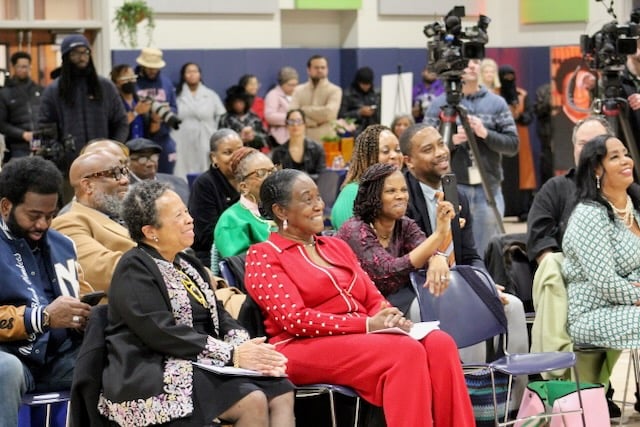
Royster and QU law professor, Marylin Ford, are pushing for more recognition for Motley.
Quinnipiac University law professor, Marylin Ford, said she would take that same tenacious spirit to the Deep South to make sure that segregationists including politicians, lawyers and judges followed the edicts of the U.S. Supreme Court’s landmark rulings in Brown vs. the Board of Education to desegregate public schools.
Ford, who is a sharecropper’s daughter, from Arkansas, said Motley’s work had a direct impact on her life. She grew up listening to stories about “that woman lawyer in the courtroom” defending the Little Rock 9.
“Judge Motley was my hero,” said Ford, who wants Motley to receive a Congressional Medal of Honor for her work. “She was my inspiration and she made it possible for so many of my family members to get an education. I am an attorney, a woman, a professor at a predominantly white university– Judge Motley did that for me.”
Ford said that many of the privileges American women and people of color enjoy are the direct results of Motley’s work, and more people need to know that history.
“I can live in any neighborhood I can afford, sit in any seat on a train or bus, eat at any restaurant, use any bathroom…we can vote, we can vote,” she said. “We can vote and enjoy all these rights and privileges because Judge Motley fought for equal justice under the law.”
Both Ford and Royster said the postage stamp is just the beginning of Motley getting her due. St. Luke’s Episcipol Church will host Gary Ford Jr., author of Constance Baker Motley: One Woman's Fight for Civil Rights and Equal Justice Under Law, Feb.11, and another commemorative celebration will take place in Chester, Conn. Feb. 17.
Royster, who followed aunt's big legal footsteps to Yale Law School, said that in the recently released book about Motley called Civil Rights Queen Constance Baker Motley and the Struggle for Equality, the author writes: “Motley’s world changing accomplishments should place her in the pantheon of great American leaders, but far too few Americans today know Motley’s name and deeds. Her likeness is not even featured on a postage stamp.”
“That’s only a year and a half ago,” she said. “Not anymore!”